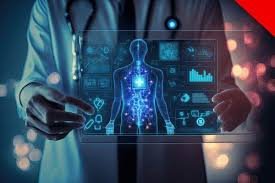Staying strong after 40 is not optional—it’s essential. Start with what you can do, build a routine, and never ignore pain or stiffness.

Artificial intelligence (AI) is rapidly transforming healthcare, reshaping how medica l professionals diagnose, treat, and manage health. From enhancing diagnostic accuracy to streamlining administrative tasks, AI applications are making healthcare more efficient, personalized, and accessible. Below are some key ways AI is influencing healthcare, along with its benefits and challenges.
AI algorithms, especially those using deep learning and neural networks, can analyze medical images with remarkable accuracy, often rivaling human experts. For instance, AI systems have shown significant success in identifying conditions like tumors, fractures, and other abnormalities in X-rays, MRIs, and CT scans. The major advantages of AI in diagnostics include:
Speed and Efficiency: AI can process vast amounts of medical data quickly, allowing for faster diagnosis and treatment.
Enhanced Accuracy: In some cases, AI can detect minute changes in imaging data that a human might overlook, improving diagnostic precision.
Improved Access: AI-driven diagnostic tools can be especially beneficial in rural or underserved areas where specialized radiologists might not be available.
AI is being increasingly used in predictive analytics to assess a patient’s risk of developing specific conditions, such as heart disease, diabetes, or stroke. These predictive models can:
Forecast Disease Risk: AI can analyze genetic, lifestyle, and environmental factors to predict potential health issues, allowing for early interventions.
Identify Trends: By analyzing population health data, AI can help predict disease outbreaks and other public health issues.
Customize Preventive Plans: Predictive insights allow healthcare providers to create personalized plans to minimize the risk of certain health issues.
AI algorithms analyze individual patient data, like medical history and genetic information, to recommend personalized treatment plans. By tailoring treatments to each patient’s unique genetic makeup, lifestyle, and response to past therapies, AI helps in:
Optimizing Drug Selection: AI helps match the right drug with the right patient, minimizing adverse effects.
Dynamic Adjustments: AI can monitor patient responses to treatments in real time, allowing for adjustments as needed.
Improved Outcomes: Personalized treatment plans lead to better patient adherence and more successful health outcomes.
AI-powered robotic systems enhance precision in surgical procedures, making minimally invasive surgeries more effective. For example, the da Vinci Surgical System assists surgeons with delicate procedures, reducing the margin of error. The advantages of AI-driven robotics in surgery include:
Reduced Costs: Automating administrative tasks cuts down operational costs.
Reduced Recovery Time: Minimally invasive procedures result in faster patient recovery.
Improved Patient Satisfaction: Less administrative work for providers means more time for patient interaction.
Enhanced Workflow Efficiency: AI-driven automation reduces manual errors in billing and scheduling.
AI-driven tools streamline administrative processes, allowing healthcare providers to focus more on patient care rather than paperwork. For example, AI can automate scheduling, billing, and record-keeping tasks. Benefits include:
Reduced Costs: Automating administrative tasks cuts down operational costs.
Improved Patient Satisfaction: Less administrative work for providers means more time for patient interaction.
Enhanced Workflow Efficiency: AI-driven automation reduces manual errors in billing and scheduling.
AI-driven chatbots and virtual assistants are increasingly used in mental health care. These tools provide round-the-clock support and are often accessible via smartphone applications. Benefits include:
Immediate Assistance: AI chatbots can provide instant support, offering coping mechanisms or a pathway to human help.
Monitoring: AI tools can track users’ emotional states over time, allowing therapists to get a comprehensive view of the patient’s mental health journey.
Reduced Stigma: Some individuals may find it easier to communicate with AI tools, lowering barriers to seeking mental health assistance.
While AI offers numerous benefits, it also brings challenges that need to be addressed:
1 Data Privacy and Security: Protecting patient information is paramount. AI systems need to handle data securely and comply with regulations like HIPAA in the U.S.
2 Bias in AI Models: AI algorithms are only as good as the data they’re trained on. Bias in medical data can lead to inaccuracies or discrimination in diagnostics and treatment recommendations..
3 Integration with Existing Systems: Many healthcare systems still use legacy software, making it challenging to integrate AI solutions seamlessly.
4 High Costs: Implementing AI technology can be expensive, especially for smaller healthcare facilities.
5 Ethical Considerations: AI’s role in making decisions about patient care raises ethical questions about responsibility and autonomy in healthcare.
Copyright © 20August 8, 2024 Dr. kanav's Joint Wellness Clinic . All Right Reserved
Hi, this is a comment.
To get started with moderating, editing, and deleting comments, please visit the Comments screen in the dashboard.
Commenter avatars come from Gravatar.
Your email address will not be published. Required fields are marked *
Dernière danse · Indila
376K
Dislike
1,447
Share
Your email address will not be published. Required fields are marked *
Your email address will not be published. Required fields are marked *
Logged in as Drkanavs. Edit your profile. Log out? Required fields are marked *
https://drkanaavpadha.com/2024/08/08/hello-world/#comment-6